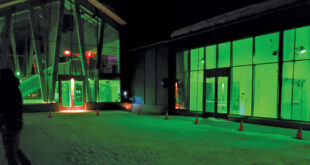Looking at possible state park designation in the future
By Katherine Nettles
It’s almost boating season, and the Shady Island River Park near Garlic Mike’s is primed for action with bathrooms, some minor upcoming adjustments to the ramp and turnaround areas and an updated fee schedule to include commercial outfitter permits.
Gunnison County commissioners approved a resolution this month amending and supplementing the fee schedule for the river park to help with maintenance and upkeep of the county-run recreation amenity. There is also talk of getting the state park system to take over the park at some point in the future as a better fit for regulating and managing it than county government.
The new fee schedule includes a new commercial fee for outfitters which had not previously been charged. The schedule still includes a $5 fee for a day pass to park a vehicle and access the river park; $15 for a weekly (seven-day) parking pass; $40 for an annual pass; $20 for an overnight camping pass; $40 for a one night group camping pass at a group site (not including individual vehicle parking passes); and now proposes a $500 fee for an annual commercial pass which includes a dedicated parking space and signage provided by the county for one vehicle and trailer, which allows overnight and continuous parking for commercial outfitters during the term of their permit.
The resolution defines a commercial outfitter as “a person or business entity soliciting or providing for compensation, outfitting services in relation to use of the Shady Island River Park.” It defines outfitting services as “providing transportation of individuals, equipment, supplies, or wildlife by means of vehicle, vessel, boat, paddle board, water craft, or similar equipment, and/or guiding, leading, supervising, instructing or training persons or groups of persons in relation to use of the Shady Island River Park, including but not limited to raft, fly fishing or stand up paddle boarding guide or equipment rental services.”
“We always intended to try to have the users pay for the ongoing maintenance of the facility, just as a good governing concept,” said assistant county manager for operations and sustainability John Cattles. He said bathroom cleaning and trash management are new costs to the county, since the bathroom construction and installations were significantly delayed, and those fees were delayed in tandem.
Cattles said the county offices will sell the permits, and he would plan to have a meeting with local outfitters to answer questions and address any concerns. The other passes can be purchased from a kiosk onsite.
Commissioner Jonathan Houck wanted to make it clear that even private fishing guides using their private vehicles cannot simply buy a $40 individual annual pass but need to buy a commercial pass. “The beauty of this is that all commercial guides have to be licensed through Colorado Parks and Wildlife,” he said. “So CPW will help us with outreach. We want to make sure we close that gap as well.”
Houck said that to manage occasional overflow for commercial companies, they could purchase additional day passes as needed. He noted the 30-minute window for pickup and drop off for any vehicles, private or commercial, which will remain available to all.
“We are aware of a couple of improvements that we need to make,” added Cattles, including the ramp area and widening the turnaround radius accessing the ramp from the parking area. Those improvements will require new asphalt in places and likely close the river park for a day or two. This led to a discussion of how best to manage the river park in the long term.
Houck said one of the main drivers for the county’s Shady Island project in the first place was Colorado Department of Transportation’s stated intention of closing North Bridge because it was in the highway right-of-way and had parking and driving safety issues.
“I would imagine that once we start charging that’s going to drive some people back across the road, and we’re going to continue that discussion with CDOT,” he said.
Commissioner Laura Puckett Daniels asked why anyone would choose a paid parking lot when there is a free one across the road.
“That’s a good question, and we’re frankly pretty frustrated because we were threatened into this position, more or less,” answered Cattles. “But we don’t have any control over what CDOT does with that parking area.”
Houck said the commissioners and the county public works department would have that conversation with CDOT.
Commissioners and staff also discussed how the broader Gunnison River area is managed by multiple jurisdictions. “The challenge is, starting in Almont it’s managed by the [US] Forest Service, then there’s some water inputs managed by the county, then you get down to the park service, BLM (Bureau of Land Management), state wildlife areas, there’s a whole mix of things going on,” said Houck. He said the county will continue looking into how it could be regulated and managed as a system, whether as a state park or other model.
County manager Matthew Birnie quipped that former commissioner John Messner had promised him the county would be out of this business by now. “We do not have the staff for this,” he said, and while the county did get several grants to build it, the ongoing maintenance is proving to be a struggle with the county departments overlapping to manage it jointly. “This is a challenge for us. We do not have a place [department] that this lives.”
 The Crested Butte News Serving the Gunnison Valley since 1999
The Crested Butte News Serving the Gunnison Valley since 1999



